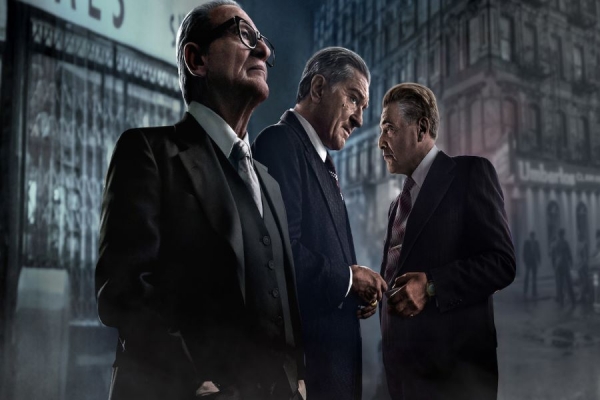A Critique of The Irishman
Written by Andrew CalderbankThe Irishman was released on the 27th of September 2019, having its world premiere at the 57th New York Film Festival, followed by digital streaming on Netflix.
Directed and produced by Martin Scorsese and written by Steven Zaillian, both having worked together on Gangs of New York and American Gangster, the eagerly awaited mob epic achieved critical acclaim.
The Irishman was the 25th film directed by the highly respected Scorsese, in a film making career spanning six decades. Scorsese was born in Flushing, Queens to hardworking Italian American parents, and raised in Manhattan’s Little Italy. Scorsese, who studied at the Tisch School of the Arts, made his first feature length debut with 1967’s Who’s That’s Knocking at My Door, and has since gone on to direct and produce such cinematic classics as Mean Streets, Taxi Driver, Raging Bull, Goodfellas, Casino and Gangs of New York.
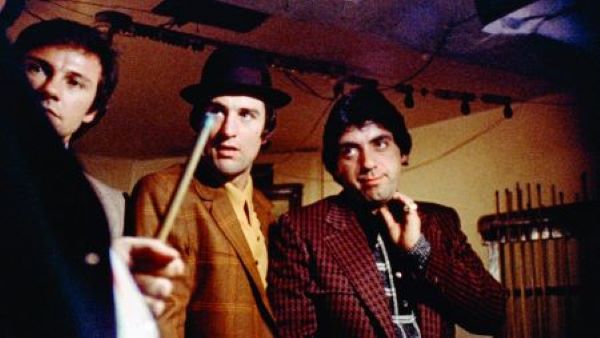
Scorsese cited as one of the most influential directors in American film history, has never taken the easy path. Unlike many directors, playing it safe with wholesome Hollywood corniness, Scorsese’s work has been characterised by exploring the darker elements of American society, laying bare the mythology of the American Dream. And more specifically perhaps, the blood-soaked world of the mob. From his 1976 tale of small-time Little Italy hoods in Mean Streets, Henry Hill's biopic Goodfellows or his 1990’ exploration of the mob run Las Vegas gambling scene in Casino, the world of the Wiseguy has played a dominant theme in Scorsese’s work.
The Irishman has a cast as strong as any, bringing together Robert De Niro, Joe Pesci, and Al Pacino, along with supporting appearances from Harvey Keitel and British actor Stephan Graham. Of course, De Niro and Pesci have previously shared the screen in Scorsese directed Raging Bull, Goodfellas, and Casino, while De Niro and Keitel starred together as small-time hoods in 1974’s Mean Streets.
Like Goodfellas, The Irishman is a story based on real-life characters and events. The film is based on I heard you Paint Houses, a nonfiction book written by former investigator Charles Brandt. I heard you Paint Houses details the life of mob enforcer and hitman Frank Sheeran and his relationship with Pennsylvania mob boss Russell Bufalino and Teamsters union leader Jimmy Hoffa. The three men brought together by an unholy alliance between the mob and the labour unions.
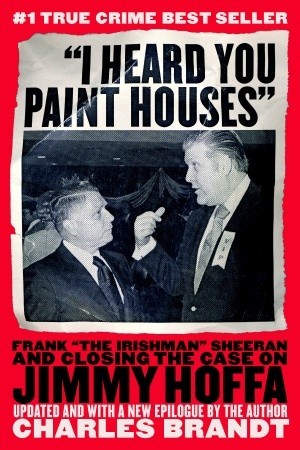
Frank Sheeran, portrayed by Robert De Niro, was an Irish American veteran of the Korean War, earning a living as a truck driver before rising through the ranks as an enforcer and hitman for the Bufalino crime family. His boss and friend, Russell Bufalino, played by Joe Pesci, was born in Italy before emigrating to the United States as a small child. Bufalino would rise the criminal ladder to eventually rule a Pennsylvania crime family that generated millions of dollars in illegal gambling, loan sharking, and labour racketeering. And it was through labour racketeering that would Jimmy Hoffa, portrayed by Al Pacino, would enter the worlds of Sheeran and Bufalino. Hoffa was the famous, or infamous depending on your viewpoint, leader of the International Brotherhood of Teamsters, which at its peak commanded a membership of over two million workers. Hoffa was at one time cited as being as powerful as the president of the United States. Hoffa has gone down in American history as a contradictory character. To his supporters, Hoffa was a man of the people, a blue-collar hero who campaigned tirelessly to improve the pay and working conditions of his union members. To many others, Hoffa was a crook, inextricably linked to organised crime.
And the one-time link between the mob and labour unions is well documented. At the mob’s peak, infiltration of unions allowed mafia families to exert a pervasive influence on everything from garbage collection to construction. The mob’s control of unions enabled them to extort legitimate business with the threat of strike action, secure no show jobs for their members, and to plunder union funds. For the mafia families of the United States, labour racketeering allowed the mob to spread its tentacles from the bread and butter of gambling, loansharking, and extortion to the world of legitimate business.
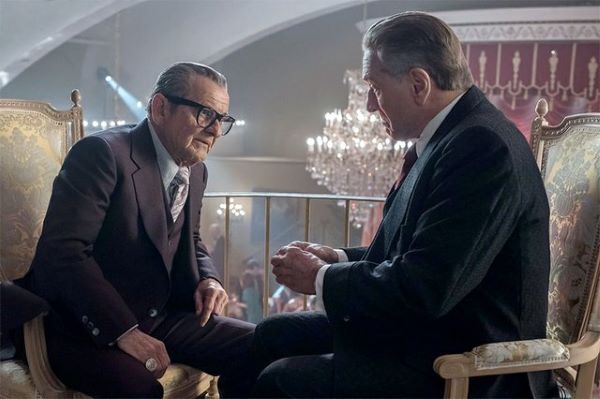
And in a story so rich and complex, characterisation is everything. De Niro’s portrayal of Sheeran is one of an unassuming blue-collar family man who happens to make a living through violence and intimidation, strapping his gun holster every bit as wearily as a construction worker ties up his steel toe capped boots. The Irishman also reveals Pesci’s underrated range as an actor. In Goodfellas Pesci’s stole some of the film’s most unsettling and memorable scenes as Luchese enforcer Tommy Di Simeone, a high pitched, pocket-sized psychopath, who exchanged Wiseguy anecdotes with brutal violence. Pesci’s Bufalino is the antithesis of his role in Goodfellas. As Bufalino, Pesci is every inch the traditional old-fashioned mob boss, quietly spoken and unassuming, but with a ruthless edge hidden beneath the surface. Pacino’s Hoffa is that of a character loaded with the contradictions of a man caught between the worlds of good and evil. Gruff and egotistical on one hand, yet charismatic and likable on the other.
The Irishman starts with Sheeran and Bufalino, to all intents and purposes a pair of aging friends, not violent mobsters, travelling across the state to attend a wedding with their wives. Their conversations at highway road stops, as their wives enjoy cigarette breaks, are interjected with scenes from the past. From Sheeran’s early years as a truck driver to his career as an enforcer and hitman for mob boss Bufalino. And it is in Sheeran’s role as a mob enforcer that Bufalino assigns him the task of looking after Hoffa, whose access to union funds is used to help fund the crime family’s illegal gambling enterprises. As the film progresses, Hoffa becomes embroiled in legal battles with attorney Robert F. Kennedy (Jack Huston) and an intense rivalry with rival union leader and mobster Tony Pro Provenzano (Stephan Graham), while becoming increasingly at odds with his so-called friends in the mob. None more so than Philadelphia mob boss Angelo Bruno, quietly and chillingly portrayed by Harvey Keitel. Much of this world of beatings, backhanders, and murder are set to a backdrop of the Kennedy years, from JFK’s inauguration to his untimely demise.
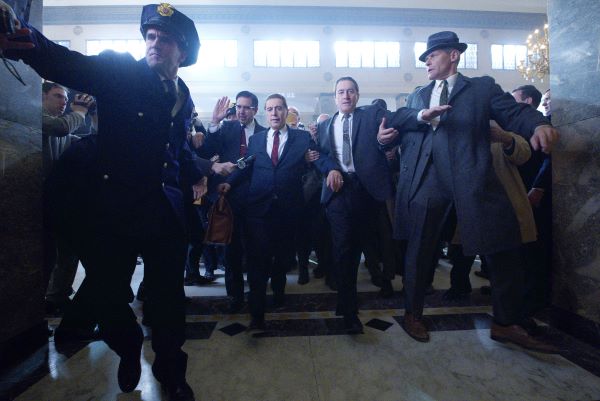
And like most great films, it is a story about relationships. Sheeran, Bufalino, and Hoffa become friends in a world in which friends kiss each other’s cheeks one minute and stab each other in the back the next, often quite literally. Hoffa, who spends time in prison on corruption charges, before fighting to take back control of the Teamsters, becomes an increasingly volatile and erratic character, increasingly resentful of having to answer to mobsters, and seemingly oblivious to how perilous his very existence is. His relationship with Sheeran and Bufalino becomes increasingly strained as the two men try and walk the tightrope of their genuine friendship with Hoffa while inhabiting a world in which treachery and murder are part and parcel of everyday life. In one telling moment, as the two mobsters discuss Hoffa’s increasingly erratic behaviour, Bufalino quietly states “if they can kill the president of the United States, they can kill Hoffa”.
And unlike many films of the mob genre, The Irishman explores the family lives of mobsters. In one scene, Sheeran’s daughter returns home upset after being told off by a local shopkeeper. Sheeran marches to the shop and beats the shop owner in front of his horrified daughter. The scenes between Sheeran and his young daughter Peggy (Lucy Gallina) reveal a resentment towards her father, and his violence, that is subtle and understated, yet palpable. Similarly, Pesci’s Bufalino finds his attempts as a genial uncle rebuffed by Sheeran’s daughter, a stark contrast to her affection for Hoffa. There is a sense that Sheeran’s daughter sees the vulnerability of Hoffa every bit as much as the violence of her father and Bufalino.
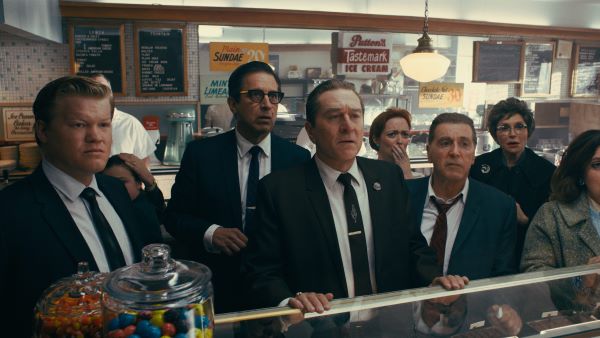
The Irishman is not the best mob movie ever made, and it is not even Scorsese’s greatest work. It does not have the adrenalin of Goodfellas, or the stylishness of Casino, but it is great tale of a time when the American mob was at the height of its powers, and its influence threatened the very foundations of American society. When the lines between good and bad, legitimate, and illegitimate became blurred. And as such, it is no coincidence that the Kennedy years provide such an important backdrop to this film, considering the enduring belief, by many, that the mob orchestrated the assassination of America’s most iconic president.
But it is more than that, the world in which The Irishman is set is fast disappearing. Traditional blue-collar neighbourhoods, that have featured so strongly in much of Scorsese’s work, have become increasingly gentrified, the world of social clubs and pool halls fast becoming replaced with trendy lounge bars or chic boutiques, mom and pop stores pushed out by high rents and corporate chains. Corporate culture and technology have changed the criminal landscape, with white-collar swindles replacing traditional blue-collar labour rackets, while smoky wire rooms have faded away in the face of internet gambling. The mob, and its control of organised crime, have become weakened by increased FBI scrutiny, wiretaps, and lengthy jail sentences. The Irishman is a story of America in a different time, and as a different place. For Scorsese, DeNiro, Pesci, and Pacino, who have spent much of their careers authentically portraying this world, there is nobody better to tell this tale.
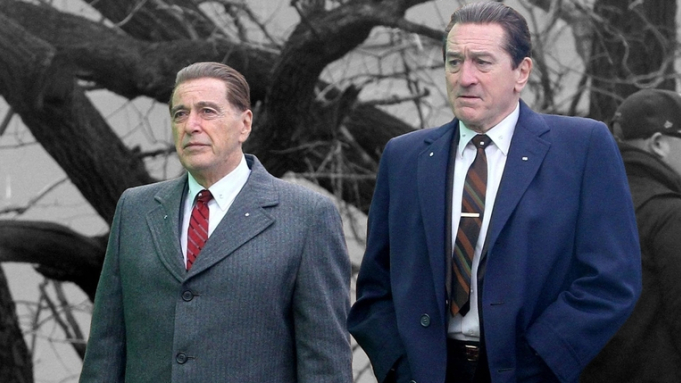
Andrew Calderbank



